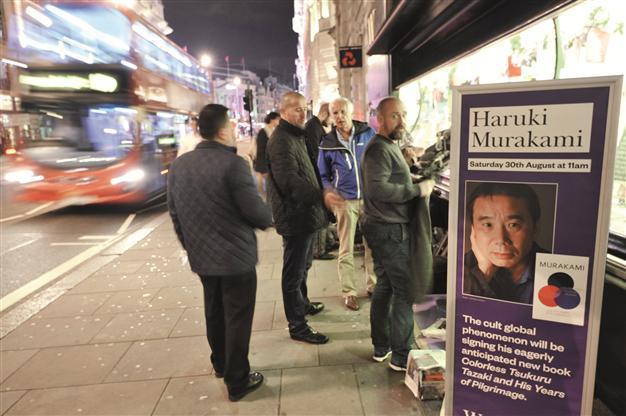Guessing game on for Nobel literature prize
STOCKHOLM - Agence France-Presse

Fans of Murakami, who is among Nobel favorites, prepare to spend the night camped on the pavement outside Waterstones bookshop in London. AP Photo
Amid fevered speculation over who gets the Nobel literature prize this year, punters and experts are considering language, geography, genre and even age to try and pin down the winner.
As Stockholm’s literary circles try to draw up an “identikit” of the successor of last year’s winner, Canadian Alice Munro, several much-cited names were considered to be in the running.
They range from Japan’s Haruki Murakami via Adonis from Syria to Kenyan Ngugi wa Thiong’o and Czech-born Milan Kundera, but no one stands out as a favourite.
“Of course we have some ideas, but they are just speculation,” Stockholm-based bookseller Mats Olin told AFP.
The name of this year’s laureate will be made public tomorrow.
In Stockholm or elsewhere, nobody really knows how the Swedish Academy - which chooses the winner - comes to its decision.
The deliberations take place behind closed doors and are only made public 50 years later.
What is known is that every year, the academy makes a list in February with all the nominations it has received - 210 this time around - which is then cut down to five names in May.
In order to make a guess, everybody tries to figure out the logic behind the secretive deliberations of the members of the academy.
First, language can be a hint. English-speaking authors have won 27 times, compared to 13 times for French and German-speaking writers each.
Claes Wahlin, a critic at Swedish tabloid Aftonbladet, said that it is “really very rare that the academy rewards the same language two years in a row”, which might exclude English after Munro’s award in 2013.
If the same language is chosen again, he said, “it must be in two parts of the world that are very distant.” That would rule out U.S. authors Joyce Carol Oates and Canada’s Anne Carson, who are recurring names in speculations.
But then on the other hand, according to Elise Karlsson, critic at Swedish newspaper Svenska Dagblad: “Nothing would be more surprising than choosing two Canadians in a row. And the academy likes surprising.”
Haruki Murakami of Japan is a favorite of online punters but less popular among experts. “Murakami is probably a readers’ favorite and certainly popular with many journalists but he lacks that extra depth,” said Karlsson. “The laureates must be able to transmit strong emotions, their writing must not only be entertaining, it must above all transmit a message that makes the reader think, see existence in a different way.”
